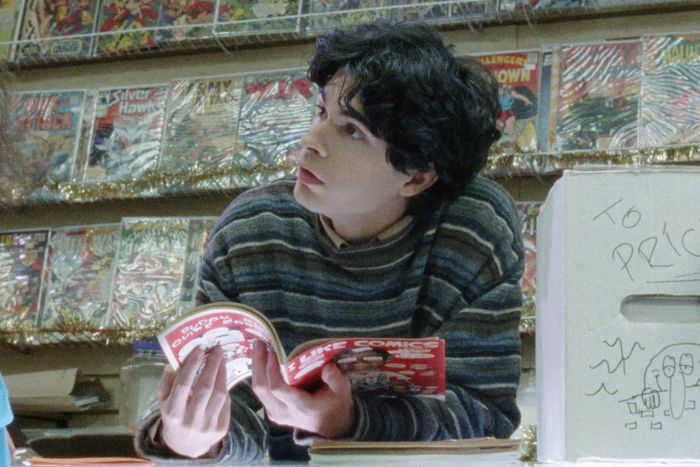
Owen Kline, the writer-director of Funny Pages, has an eye for faces, and his film is filled with people who look like they stepped right out of the underground comix his teenage protagonist, Robert (Daniel Zolghadri), reveres. Miles (Miles Emanuel), Robert’s mild-mannered best friend and a fellow aspiring comic-book artist, has a long jaw, cheeks that are spectacular moonscapes of cystic acne, and frizzy, shoulder-length hair that frames his features like doleful curtains. Barry (Michael Townsend Wright), an older man with whom Robert briefly shares an apartment, has the mug of a ruddy-cheeked vaudeville star who has somehow been transported to 21st-century Trenton, his aspirational combover plastered to his forehead by his permanent glaze of sweat. Wallace, the former Image Comics employee Robert gloms onto as a real professional — despite Wallace’s protestations and the fact that Robert can’t stand superhero fare — is the most distinctive at all. Played by the excellent character actor Matthew Maher, who was born with a cleft palate, he has a perfectly ovoid head which, combined with a constant look of suspicion, gives him the aura of a hostile Humpty Dumpty.
It’s only Robert, with his tousle of dark hair, who is poised to slide into conventional and forgettable handsomeness, a fact that he would deeply resent. Funny Pages, a debut as packed with promise as with underdeveloped ideas, is a wry movie about a guy who’s eager to shuck off his upper-middle-class existence for the squalor and struggle he sees as essential to artistic legitimacy, and the visual divide between its main character and the people he surrounds himself with serves as a constant reminder of that contrast. The idea of authenticity that so grips him comes from the artists Robert studies, but also from his teacher, Mr. Katano (Stephen Adly Guirgis), who opens the film exhorting his mentee to embrace subversion and to skip college, lest it ruin him. Katano clearly oversees a kind of misfit sanctuary in school and in his own home, though he crosses a line in that first scene. After stripping down to his socks and urging Robert to sketch the fleshy realities of his own middle-aged body, he tries to make sure things are okay between him and a spooked-but-trying-not-to-be Robert, getting into a fatal car crash in the process.
If you consider Funny Pages as a Catcher in the Rye riff, which wouldn’t be inaccurate, Katano occupies a place somewhere between the dead brother and the possibly lascivious English teacher Mr. Antolini. Like Holden Caulfield, Robert is a moody, troubled little shit channeling his unresolved grief and general angst into going on the lam, though in his case he never gets out of New Jersey. To the exasperation of his Princeton parents (Maria Dizzia and Josh Pais), he declares his intentions to drop out of school, starts augmenting his comic-book store job with work for the legal aid lawyer (Marcia DeBonis) who helps him out of a scrape, and moves into a hilariously terrible basement apartment out of a David Lynch film. Then, having decided this shaky new existence counts as the start of his independence, he starts trying to befriend Wallace after encountering him at work, persistently ignoring the reality of the man’s miserable life out of certainty that he holds the key to Robert’s future. Shot on 16-mm., Funny Pages has a warm, muted palette that makes it feel unmoored from time, though that’s more a testament to the purgatory its characters occupy.
Kline’s got talent, and a readiness to lean into the peevishness of Robert’s naïve rebellion without making a stunt of it. (In that, he has a solid ally in Zolghadri, who’s maybe best known as the older boy who tries to sexually coerce Elsie Fisher’s character in Eighth Grade.) But while Kline’s affection for the oddballs he puts on screen feels genuine, there’s also a level of calculation to how he depicts them — unlike the Safdie brothers, who produced the film, and whose work hurls itself wholeheartedly into the peripheral communities in which it’s set, he can’t help but regard his characters at a self-aware remove, appreciating them as good material rather than people. Funny Pages is a canny portrayal of a young man from a comfortable background going on a sojourn amid the outcasts, failures, and economically desperate, but you get a sense, by the end of the film, of Kline playing tourist himself. The 30-year-old son of Kevin Kline and Phoebe Cates, Kline is a born and bred New Yorker who was one of the child stars of The Squid and the Whale, and bounced around working at the Anthology Film Archives and Other Music as he grew up.
That’s a culturally privileged existence that’s as far from the exurban purgatory in which Robert grew up as the Trenton basement the character rents is from his own comfortable childhood home. That distance really comes through in the abrupt end, in which the film cuts off without the final act it demands, as though Kline is reluctant to have his main character go through a redemptive moment, but also can’t imagine what else is next. The truth is that kids like Robert usually do go to college after all, and get internships, and might even find their way into the upper ranks of publishing houses where they’ll someday tell outsider artists that they love their work, but it’s just not commercial enough for their company — but that might be too grim for even a black comedy.


